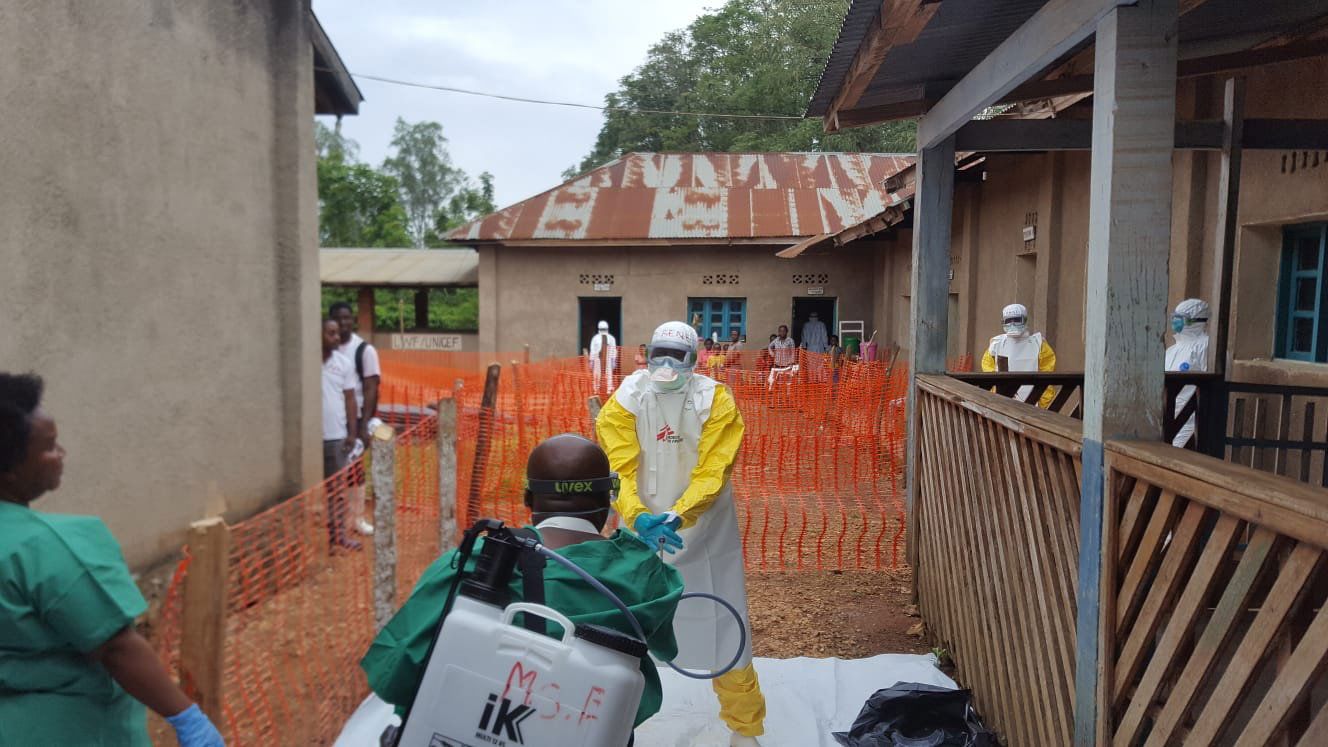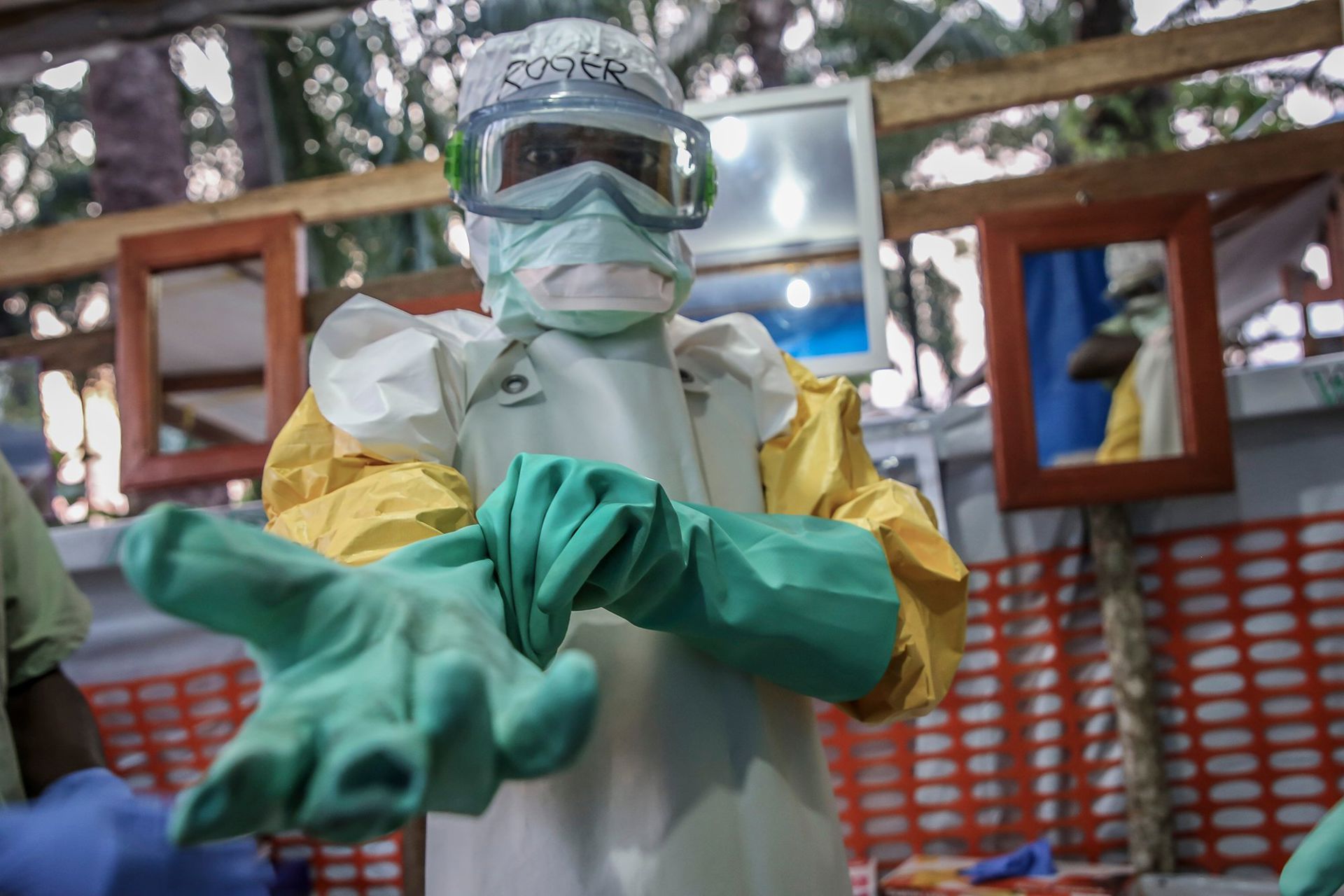Médecins Sans Frontières (MSF) has treated 65 patients confirmed to be suffering from Ebola in its first month of intervention in North Kivu. This is more than 80% 1 of the total number of confirmed patients hospitalized in Ebola Treatment Centres so far this epidemic. Of the patients confirmed Ebola positive in Mangina Ebola Treatment Centre, 29 have recovered and returned to their families whilst three patients remain under treatment.
“We are at a crucial point in the epidemic” said Berangère Guais, MSF’s Emergency Coordinator in Beni. Yes, the number of patients in the treatment centre has reduced significantly but new cases from a number of different chains have emerged in recent days. We must continue to work with the community to build trust and ensure that everyone presenting with symptoms of the Ebola is isolated and tested quickly. We just cannot lay down our guard until the epidemic is declared over”
On the eve of the 1 August declaration of the province of Nord Kivu’s first Ebola epidemic, MSF teams working in a hospital in Lubero arrived in Mangina, the epicentre of the outbreak. They immediately begin mounting a response against the virus alongside the Congolese Ministry of Health. In the days that followed experienced MSF staff arrived from across the Democratic Republic of Congo and around the world to help train local staff and work with them side by side in order to care for the sick and prevent the outbreak from spreading.
“We knew we had to act fast. When we arrived, we saw that the local health centre in Mangina was overwhelmed. A number of health staff were ill and the number of patients was increasing each day. They were doing their best but everyone was crowded together in one ward of the hospital. We had to work quickly to improve the situation for both the patients and the staff,” said Patient Kamavu, an experienced nurse from MSF’s Congo Emergency Pool who arrived on site on 3 August.
By 6 August MSF had improved the safety of the isolation unit for suspected and confirmed patients in a ward of the Mangina Health Centre and constructed another inside the Hospital General de Reference in Beni. The team had also begun constructing a treatment centre in Mangina. The Mangina Ebola Treatment Centre, with a capacity to care for 68 patients and expand to 74 beds if needed, opened on 14 August. Thirty-seven patients were transferred from the Mangina isolation ward to the Ebola Treatment Centre that day. The Beni isolation ward was completed and handed over to the Ministry of Health who assigned its management to another NGO.
“We focused on patient care whilst our logistics and water and sanitation team worked day and night to complete a treatment centre that could care for patients in a safe way,” continued Patient. “It was incredible, we’d make visits to the site just one day later and see a totally different hospital appearing.”
MSF also constructed and opened a 7-bed transit centre in Makeke (on the Nord Kivu-Ituri border) on 28 August in response to a number of cases in the area and community resistance to transferral in Mangina as a temporary measure whilst another organisation builds an Ebola Treatment Centre. Now, suspect patients can be isolated and tested for the Ebola virus close to their homes and will only be transferred by road to one of the treatment centres if they test positive.
During the course of this epidemic MSF has also been able to offer new treatments to patients with confirmed Ebola infection under a compassionate use protocol. These treatments are given only with the informed consent of the patient (or a family member if they are too young or too sick to consent) and are provided in addition to the supportive care (hydration and treatment for the symptoms of Ebola like diarrhea and vomiting) that MSF offers to all Ebola patients.
“It’s a great relief to finally be able to offer patients more than supportive care. Statistically, Ebola patients have had less than a 50% chance of survival. This is devastating and terrifying to families and the community,” ends Patient.
Outside of Ebola Treatment Centres, MSF teams working in the Beni and Mangina area as well as in Ituri, between Mambasa and Makeke (on the border with North Kivu) are visiting health centres and training staff on the proper triage of Ebola suspects, donating crucial protection material as well as setting up isolation areas where patients suspected of carrying the virus can be safely cared for whilst an ambulance arrives. Health centres in Mangina and Beni that have seen positive cases are also being decontaminated.
“Sadly, in this epidemic we have seen at least 17 health workers infected with Ebola. Health staff caring for patients with illnesses like malaria and pneumonia, or assisting women to give birth, must be protected by a proper triage system which identifies and isolates suspect Ebola patients before they enter a hospital. This will not only protects health workers but also their patients and prevent health centres becoming centres of amplification for the spreading of the virus,” ends Berangère Guais.
MSF has recently received approval to commence a vaccination campaign for frontline workers on the axis between Makeke and Biakato.
TIMELINE OF THE MSF INTERVENTION:
>30/7: MSF receives an alert about suspect cases of Ebola near Beni/Mangina, North Kivu, north-eastern Democratic Republic of Congo.
>31/7: An MSF team from the nearby project in Lubero (roughly 3 hours away by car) arrives on site with a team from the Ministry of Health to investigate;
>1/8: The Ministry of Health declares an Ebola outbreak in Mangina.
>1-3/8: MSF prepares to respond to the outbreak, within the masterplan of the Ministry of Health.
>6/8: MSF isolation unit improved in Mangina reference health centre, trainings done on PPE utilisation, triage, infection prevention and control (IPC). MSF also builds an isolation unit in Beni.
>7/8: Results of genetic analysis from the national laboratory confirm that the circulating virus is of the Zaire strain, but is not linked to the one reported in the Equator outbreak earlier this year.
>8/8: Vaccination of frontline health workers begins under WHO’s supervision. MSF doesn’t participate to this intervention.
>13 /8: An Ebola case is declared in Mambasa, in Ituri region. A MSF team arrives on the site.
>13/8: MSF starts the decontamination of the local health centre in Mangina as well as other health centres with confirmed cases
>14/8: MSF’s Ebola Treatment Centre opens in Mangina – tents not far from the isolation unit of the Mangina health centre.
>24/8: MSF begins offering new therapeutic drugs to eligible patients in the ETC in Mangina
>28/8 MSF opens a transit centre in Makeke
>2/9: A MSF team arrives in Butembo to investigate an alert about a suspect case in the city.
>4/9: The case in Butembo is confirmed.
>5/9 :The MSF team begins to set up a small isolation centre, assist in the transport of suspected Ebola patients to Ebola Treatment Centres and decontaminate the health structure where the confirmed case died.
1Sixty-five confirmed patients were admitted to the Mangina Ebola Treatment Centre, in addition to the 16 treated in the Ebola Treatment Centre of Beni by the 3rd of September, one month after MSF began caring for Ebola patients in Nord Kivu. The other 10 confirmed cases listed by the Ministry of Health at that time died in the community and tested positive after death and were therefore never admitted to Ebola Treatment Centres



